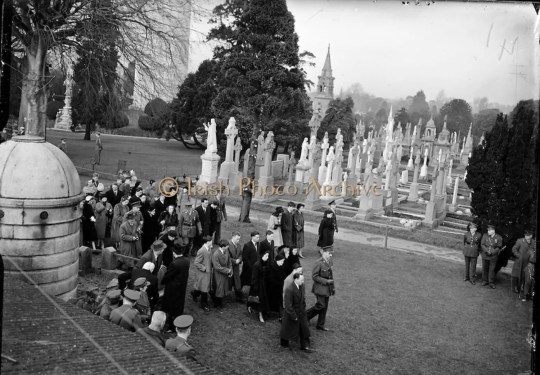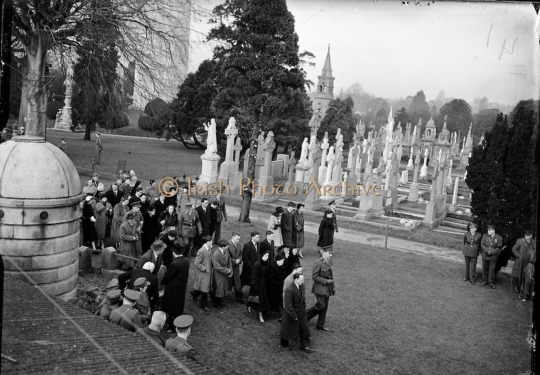#Baluba tribesmen
Explore tagged Tumblr posts
Text
#OTD in 1960 – An Irish peacekeeping force is ambushed in the Congo, causing the first overseas combat deaths of the Irish Republic.
Nine Irish peace-keeping troops die in the Niemba massacre in Congo. A total of 26 Irish troops died during the Congo deployment for which they were totally unprepared. Irish troops arrived with heavy wool uniforms and having been advised by Archbishop of Dublin Dr. McQuaid that the Congolese were “a very gentle people.” The Baluba tribesmen of the Congo quickly changed that…

View On WordPress
#Ambush#Anthony Browne#Baluba tribesmen#Central Africa#Congo#Ireland#Irish History#Irish Peace Troops#Medal of Gallantry#Niemba Massacre#UN Mission
8 notes
·
View notes
Text
How Would You Feel If Your Greatest Triumph Was Stolen?
An Unlikely Hero
In September 1961, Pat Quinlan, then aged 42 and Commandant of ‘A’ Company of the 35th Irish Battalion, looked out on the small mining town of Jadotville in the Congo. He and the 156 men under his command were part of a U.N. peace-keeping mission, tasked with offering protection to the Jadotville population from local Baluba tribesmen, thought to be armed with bows and arrows and sympathetic to separatist Kantangan forces.
But something wasn’t right. On their arrival at Jadotville, few if any of the town's people had come out to welcome them. His men, mostly in their teens and 20’s were inexperienced and to add to his growing concern, field communication with his HQ was intermittent at best.
Quinlan ordered his men to dig trenches and take up defensive positions on the town’s perimeter. Additionally, he also insisted that every available receptacle should be filled with water, even though he had been told to expect reinforcements later that day. What Quinlan didn't know was that a large force of between 3000 and 5000 men, comprising Baluba warriors bolstered with regular French, Belgian, Rhodesian and South African mercenaries had gathered outside the town. The Irishmen had been lured into a trap by the Belgian Government as part of a broader play for control and influence in the Congo and were now completely surrounded.
Surprise Attack
‘A’ Company was at Mass on the morning of the 13th September when a surprise attack was launched. Jeeps carrying mounted machine-gun and foot soldiers bore down across 600 metres of open ground toward the sentries Quinlan had posted. The young men in these positions sent warning fire over the heads of the advancing troops bringing Quinlan and his men tumbling out of the church to hurriedly take up their positions.
The road into Jadotville was blocked, preventing any prospect of immediate relief. ’A’ Company, was cut off, totally surrounded and confronted by, in number and in fire-power, an overwhelmingly superior force.
This first attack was beaten away. It was 'A' Company's first taste of live action. Within minutes Quinlan observed approximately 600 men advancing towards their flank, where No 1 Platoon was positioned. Mortar fire was being directed at them and there was heavy in-coming machine gun fire.
‘A’ Company fought back with the mainly light, personal weapons they had. The enemy was once again repulsed, so setting the pattern for the next several days. ‘A’ Company hung on, grimly countering wave after wave of attacks.
Leadership Under Fire
Throughout the siege, Quinlan ensured he was highly visible to his men. He worked constantly to maintain morale, reminding the men of their duty and urging them to hold on for the expected relief. A glimpse of the tone he set can be seen in a radio report he sent at the height of the siege:
"We will hold out until our last bullet is spent. Could do with some whiskey"
The promised relief never came however and after four days of more or less constant fighting, with ammunition dwindling and low on water and food, Quinlan acted to protect his men. He negotiated a ceasefire, only to be betrayed and then forced to surrender.
At the end of hostilities, astonishingly, all of Quinlan’s men were alive, although five were injured. Some 300 of the Kantaganese were killed, with reports of up to 1000 injured.
Quinlan and his men were taken into captivity, and held prisoner for over a month before their release.
The Sorry Aftermath
Rose Doyle, Quinlan's niece, wrote many years later:
"The problem was that they did not die. Dead, they would have been heralded and sung about the stuff of legend and of pub ballads about Ireland's great and glorious martyrs…(instead) they were systematically reviled, ostracised and written out of the history books."
‘A’ Company’s exploits were not celebrated. In fact the events were spun to look like an embarrassing and humiliating failure. Pat Quinlan died in 1997, his reputation diminished, except in the eyes of the men he led.
It wasn't until 2006 that the Irish Government, officially honoured the 70 surviving men of 'A' Company, following a long campaign from among others Liam Donnelly, a surviving member of 'A' Company.
At an emotional ceremony, the U.N. military commander in Katanga, Brig. Kas Raja was recalled as saying:
"The Irish troops in Jadotville were magnificent and the Irish commander Comdt Quinlan would, in the Indian army, be awarded the highest military award for gallantry. I believe he could be held as an example to all soldiers."
Pat Quinlan never got to hear those words.
The Takeaway
The events which took place at Jadotville (today known as Likasi) and their depressing aftermath, suggest that a leader’s finest achievements may never be acknowledged.
Perhaps it is as Shakespeare wrote in Julius Caesar:
"The evil that men do lives after them; the good is oft interred with their bones".
In Pat Quinlan's case, his heroism and that of the men he commanded was unjustly ignored, at least in his lifetime. Hard though that must have been to bear, I like to think he would have been consoled by the knowledge that when his time came, he did the right thing.
Pat Quinlan's story is a reminder that doing what's right is always more important than glory and reward.
Question: If your best work is never acknowledged, what keeps you going?
Further reading
The Siege at Jadotiville – The Irish Government's Forgotten Battle by Declan Power
The Heroes of Jadotville – The Soldier's Story By Rose Doyle
0 notes
Text
#OTD in 1960 – An Irish peacekeeping force is ambushed in the Congo, causing the first overseas combat deaths of the Irish Republic.
#OTD in 1960 – An Irish peacekeeping force is ambushed in the Congo, causing the first overseas combat deaths of the Irish Republic.
Nine Irish peace-keeping troops die in the Niemba massacre in Congo. A total of 26 Irish troops died during the Congo deployment for which they were totally unprepared. Irish troops arrived with heavy wool uniforms and having been advised by Archbishop of Dublin Dr. McQuaid that the Congolese were “a very gentle people.” The Baluba tribesmen of the Congo quickly changed that…

View On WordPress
#Ambush#Anthony Browne#Baluba tribesmen#Central Africa#Congo#Ireland#Irish History#Irish Peace Troops#Medal of Gallantry#Niemba Massacre#UN Mission
5 notes
·
View notes
Text
#OTD in 1960 – An Irish peacekeeping force is ambushed in the Congo, causing the first overseas combat deaths of the Irish Republic.
#OTD in 1960 – An Irish peacekeeping force is ambushed in the Congo, causing the first overseas combat deaths of the Irish Republic.
Nine Irish peace-keeping troops die in the Niemba massacre in Congo. A total of 26 Irish troops died during the Congo deployment for which they were totally unprepared. Irish troops arrived with heavy wool uniforms and having been advised by Archbishop of Dublin Dr. McQuaid that the Congolese were “a very gentle people.” The Baluba tribesmen of the Congo quickly changed that…

View On WordPress
#Ambush#Anthony Browne#Baluba tribesmen#Central Africa#Congo#Ireland#Irish History#Irish Peace Troops#Medal of Gallantry#Niemba Massacre#UN Mission
6 notes
·
View notes
Text
#OTD in 1960 – An Irish peacekeeping force is ambushed in the Congo, causing the first overseas combat deaths of the Irish Republic.
#OTD in 1960 – An Irish peacekeeping force is ambushed in the Congo, causing the first overseas combat deaths of the Irish Republic.

Nine Irish peace-keeping troops die in the Niemba massacre in Congo. A total of 26 Irish troops died during the Congo deployment for which they were totally unprepared. Irish troops arrived with heavy wool uniforms and having been advised by Archbishop of Dublin Dr. McQuaid that the Congolese were “a very gentle people.” The Baluba tribesmen of the Congo quickly changed that perception.
Respondin…
View On WordPress
#Ambush#Anthony Browne#Baluba tribesmen#Central Africa#Congo#Ireland#Irish History#Irish Peace Troops#Medal of Gallantry#Niemba Massacre#UN Mission
5 notes
·
View notes
Text
#OTD in 1960 – An Irish peacekeeping force is ambushed in the Congo, causing the first overseas combat deaths of the Irish Republic.
#OTD in 1960 – An Irish peacekeeping force is ambushed in the Congo, causing the first overseas combat deaths of the Irish Republic.
Nine Irish peace-keeping troops die in the Niemba massacre in Congo. A total of 26 Irish troops died during the Congo deployment for which they were totally unprepared. Irish troops arrived with heavy wool uniforms and having been advised by Archbishop of Dublin Dr. McQuaid that the Congolese were “a very gentle people.” The Baluba tribesmen of the Congo quickly changed that perception.…
View On WordPress
#Ambush#Anthony Browne#Baluba tribesmen#Central Africa#Congo#Ireland#Irish History#Irish Peace Troops#Medal of Gallantry#Niemba Massacre#UN Mission
3 notes
·
View notes
Text
#OTD in 1960 – An Irish peacekeeping force is ambushed in the Congo, causing the first overseas combat deaths of the Irish Republic.
#OTD in 1960 – An Irish peacekeeping force is ambushed in the Congo, causing the first overseas combat deaths of the Irish Republic.
Nine Irish peace-keeping troops die in the Niemba massacre in Congo. A total of 26 Irish troops died during the Congo deployment for which they were totally unprepared. Irish troops arrived with heavy wool uniforms and having been advised by Archbishop of Dublin Dr. McQuaid that the Congolese were “a very gentle people.” The Baluba tribesmen of the Congo quickly changed that perception.
Respondin…
View On WordPress
#Ambush#Anthony Browne#Baluba tribesmen#Central Africa#Congo#Ireland#Irish History#Irish Peace Troops#Medal of Gallantry#Niemba Massacre#UN Mission
2 notes
·
View notes
Text
1960 – An Irish peacekeeping force is ambushed in the Congo, causing the first overseas combat deaths of the Irish Republic. Nine are killed by Baluba tribesmen – one of these, Anthony Browne, will be awarded the Military Medal for Gallantry.
1960 – An Irish peacekeeping force is ambushed in the Congo, causing the first overseas combat deaths of the Irish Republic. Nine are killed by Baluba tribesmen – one of these, Anthony Browne, will be awarded the Military Medal for Gallantry.
Nine Irish peace-keeping troops die in the Niemba massacre in Congo. A total of 26 Irish troops died during the Congo deployment for which they were totally unprepared. Irish troops arrived with heavy wool uniforms and having been advised by Archbishop of Dublin Dr. McQuaid that the Congolese were “a very gentle people.” The Baluba tribesmen of the Congo quickly changed that perception.
Respondin…
View On WordPress
#Ambush#Anthony Browne#Baluba tribesmen#Central Africa#Congo#Ireland#Irish History#Irish Peace Troops#Medal of Gallantry#Niemba Massacre#UN Mission
1 note
·
View note